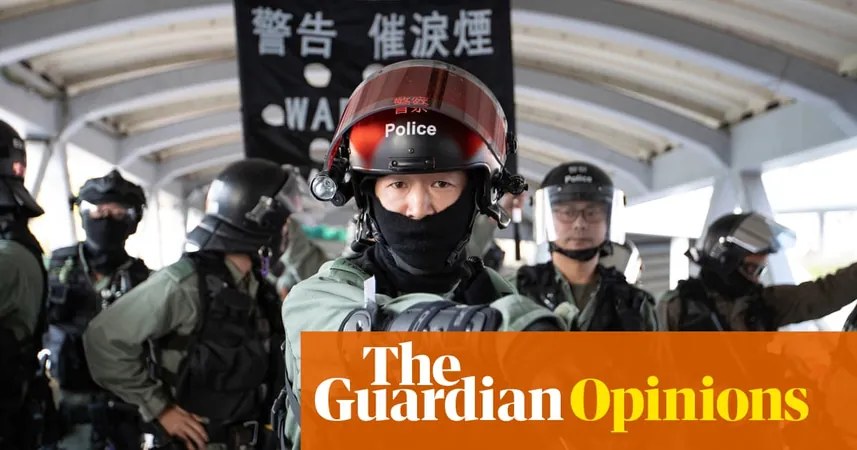
The Silent Transformation: How Hong Kong's Security Laws Changed Our Lives Forever
2024-12-02
Author: Ming
Introduction
Growing up in Hong Kong, I, like many, adored the image of law enforcement embodied by figures such as my uncle, a police officer. In the late 1980s and 90s, the police were seen as courageous protectors of the public. I fondly remember struggling with English during my early school years, and how my uncle helped me with my studies while also instilling in me a love for physical fitness. His determination to serve and protect painted him as a hero in my young eyes.
The Turning Point: Summer of 2019
However, that positive perception took a stark turn by the summer of 2019. The pro-democracy protests erupted, and with them, a visceral sense of betrayal emerged as police brutality became evident. Reports of violent crackdowns transformed them from role models into symbols of oppression. A heartbreaking moment for me was witnessing a fellow journalist being blinded by a rubber bullet while documenting the protests—a vivid testament to the changing tides.
A Divided Family
At a family gathering that summer, my uncle confronted me about my involvement in the protests, questioning my motives in a way that illustrated the growing divide within our family and society. His comments echoed a troubling sentiment that many felt: the notion that dissent could only be motivated by financial gain. I knew then that the world we grew up in could never be the same again.
The National Security Law
Following the massive outpouring of dissent, the Hong Kong government introduced a draconian national security law. This law instituted severe penalties for crimes like treason and insurrection, effectively criminalizing peaceful protest and dissent. One particularly chilling aspect was the introduction of a hotline designed to encourage citizens to report their neighbors for any perceived violations. What was once a means of seeking help from law enforcement became a mechanism for surveillance and instilling fear.
A Shift from Laughter to Anxiety
Initially, my friends and I laughed off the absurdity of the situation; our jokes about calling the security hotline for trivial matters provided a fleeting escape from the suffocating reality. However, those lighthearted conversations soon withered away. An atmosphere of constant vigilance and anxiety replaced our laughter, as we were left uncertain about who might be listening or recording our words. The pervasive fear of being reported turned our once open conversations into a suffocating silence.
Escalation of Surveillance
Surveillance in Hong Kong escalated at an alarming rate. Cameras equipped with facial recognition technology infiltrated public spaces, shopping malls, mass transit systems, and even residential buildings. The sense of community we once enjoyed transformed into a struggle for privacy and safety, as the government’s watchful eye left us feeling vulnerable.
A Visit to Admiralty
The day before I left Hong Kong in 2021, I visited a place that had become emblematic of the struggles for democracy: Admiralty. This area, where significant protests had sprouted in 2014 and 2019, held memories of utopian dreams of freedom and equality. Yet when I arrived, the vibrant pedestrian bridge I had cherished was now encased in barbed wire, heavily surveilled, and stripped of its former life. Walking through that space was like wandering through a prison yard.
The Loss of Trust
The heart-wrenching reality is that the trust that once flourished among friends and family has diminished into a pervasive fear—a “white terror” that grips all interactions. Social media gatherings, once filled with lively discussions, now lay dormant as friends censor themselves, terrified of dissenting opinions being reported. One friend recently expressed their pain to me: 'I feel like I wear a mask every day. Inside, I’m bubbling with frustration, but I can’t voice it. I don’t want to be the next one reported.'
Conclusion: A New Reality
The landscape of Hong Kong has irreversibly changed, and with it, our dreams and our voices have been silenced. What once was a vibrant society woven with trust is now overshadowed by fear and suspicion, leaving us longing for the Hong Kong we once knew. Our struggle continues, not only for freedom but to reclaim our right to express ourselves—to speak, to dream, and above all, to hope for a future where silence does not reign.




 Brasil (PT)
Brasil (PT)
 Canada (EN)
Canada (EN)
 Chile (ES)
Chile (ES)
 España (ES)
España (ES)
 France (FR)
France (FR)
 Hong Kong (EN)
Hong Kong (EN)
 Italia (IT)
Italia (IT)
 日本 (JA)
日本 (JA)
 Magyarország (HU)
Magyarország (HU)
 Norge (NO)
Norge (NO)
 Polska (PL)
Polska (PL)
 Schweiz (DE)
Schweiz (DE)
 Singapore (EN)
Singapore (EN)
 Sverige (SV)
Sverige (SV)
 Suomi (FI)
Suomi (FI)
 Türkiye (TR)
Türkiye (TR)